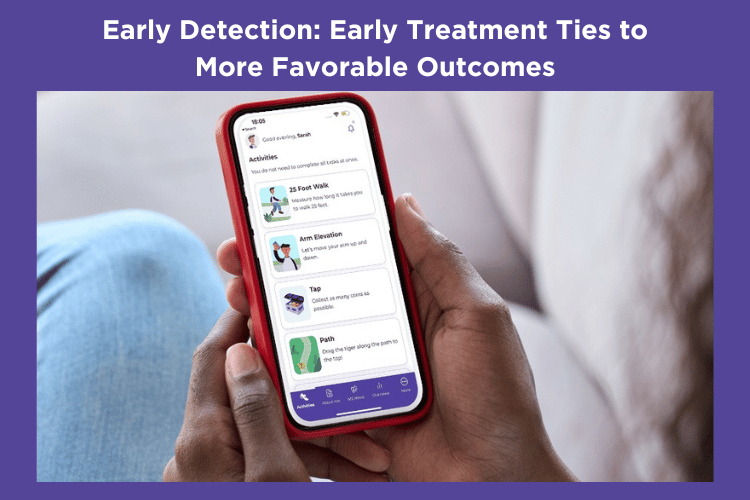Overview of Early Treatment
After a lengthy debate, early treatment of multiple sclerosis is now strongly advocated by MS experts. Our blog, “Insights into Early Treatment,” explored two trials that studied the effect of drug therapy after the onset of Clinically Isolated Syndrome (CIS). The study results revealed that early intervention decreased the percentage of high-risk patients who develop clinical MS. On the other hand, delayed treatment increased the likelihood of developing MS for the studied CIS patients.
Another critical measure of the impact of early treatment is Patient Reported Outcome Measures (PROMs) which focus on the patient experience. For example, a recent study from Sweden used PROMs to underscore the importance of early intervention for patients with relapsing-remitting multiple sclerosis (RRMS). Specifically, the study demonstrated that earlier disease-modifying treatments (DMT) improved PROMs.
Let’s first look at the role of patient-reported outcomes in clinical studies.
Early Detection of MS: Available Measures for Clinical Research
By way of background, approaches to measuring clinical response to treatment for MS patients include:
- MRI scans.
- Physician assessments of the patients (based on in-office examinations).
- Patient-reported outcomes measures.
Patient-reported outcome measures effectively track treatment outcomes in MS. The report of a patient’s health condition comes directly from the patients, based on their perceptions, without interpretation by a clinician. PROMs serve as a communication vehicle that benefits patients and clinicians for three primary reasons.
- PROMs serve as another means for patients to communicate their symptoms to their providers, which may result in therapeutic changes.
- Subjective symptoms can be translated into validated scales, standardizing reporting of patient symptoms.
- Clinicians gain visual, quantitative values that may provide further insight into symptom severity. Source
The Swedish Study
The study is based on a comprehensive database in Sweden. Researchers from the Karolinska Institute in Sweden sourced data from the Swedish MS registry, a national database of approximately 80% of the country’s patients with MS. Since 2007, the registry started collecting PROMs. The sample size was 7,849 patients.
Researchers compared patient-reported outcome measures of patients with relapsing-remitting MS (RRMS) who started disease-modifying treatment (DMT) within the first two years after the onset of symptoms to RRMS patients who started later, two to four years after the diagnosis. The study matched the two groups to balance cohort differences. For example, the mean age of patients at onset was similar between the two groups (35.32 and 35.23 years), the gender distribution was approximately equal, and the median disability scores (EDSS) were comparable at baseline (1.5 and 1.0).
After an average of seven years from disease onset, patients completed the Multiple Sclerosis Impact Scale (MSIS), an MS-specific PROM. The 29-question survey asks patients about their views on the physical and psychological impact of MS in their daily life. (For more on MSIS, go here).
The Results
The results highlighted the physical and psychological benefits of early initiation of treatment. The key findings were:
- Patients who started DMT later reported their physical symptoms as more troublesome than those who started treatment earlier. The later-treated group revealed a 31% higher physical score of disability.
- Similarly, an MSIS psychological score was higher for those treated later than the early treatment group. (The difference was 12%).
- Functional outcome measures were better in the early treatment group as well.
Further, the analysis showed that every year the DMT was delayed, there were worsened outcomes in terms of the MSIS physical score, the disability score, and the MSIS psychological score.
The bottom line: both clinical trails using objective measures and this study which draws from PROMs reach the same conclusion. Delayed diagnosis of disease and the resultant delayed initiation of treatment leads to worsened clinical outcomes.
How BeCare MS Link Can Help: Early Detection
The importance of patient-reported outcomes is partly based on the neurologic assessment’s lack of sensitivity. In other words, patients may detect their first symptoms of MS before the physician can find evidence of the disease in a clinical exam.
This is where BeCare MS Link comes in. Because the BeCare MS Link app follows the neurologic exam quantitatively with AI analysis, it will detect clinical change before a clinician might and can help validate patient-reported symptoms. Enabling early disease detection is one way that BeCare Link accomplishes our overarching mission to help patients realize better health outcomes.
For the complete Swedish research study, go here.
Download BeCare MS Link today. You’ll see how our app can monitor MS and help you – and your doctor – manage your care.
